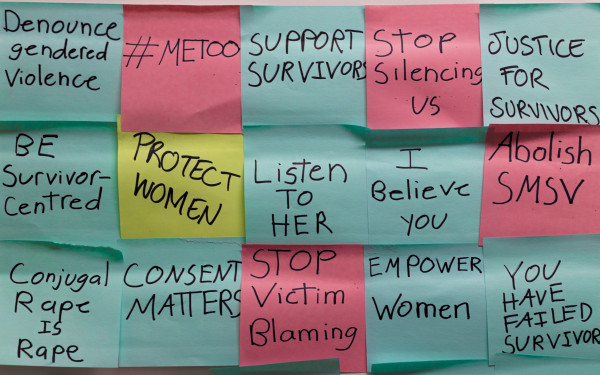A Rotten Apple Spoils the Bunch
How Gender Biases in STEM Create Oppressive Environments
Women have made astonishing gains in the past 50 years, shattering gender bias in all aspects of life. More young women are choosing careers in traditionally male-dominant fields, such as engineering and technology.
Coming from a computer science engineering background, I have seen an increase in female enrollment in Concordia’s engineering department. But having worked in the corporate sector for two years, I have also had my share of discrimination at work.
Being considered not good enough for a certain project and having to turn a deaf ear every time my colleagues made a sexist joke were a part and parcel of my everyday life. Although there are women working with equal status at every level of a company, there’s still an air of discrimination, in many cases, that very subtly keeps reminding women that they aren’t a part of the team.
At a panel hosted by the multinational software company Autodesk, I had a chance to meet successful female figures in the technology industry who have devoted their lives to their careers. The issues that came up made me realize that although a lot has changed, there are still a few small minds who perpetuate this stigma which force women to constantly contemplate their every action, just so that they are considered capable by their peers.
Janick Valois, a quality assurance manager, noted that most of the time women are told to “act like a man,” a phrase which holds no specific meaning. Nonetheless, a lot of women are subjected to it.
It was also mentioned that women have to dress down just to be taken seriously. They pass on wearing their new floral skirt or their colourful high heels. Most women are afraid to be branded as “dumb,” a fear that fuels a slew of insecurities. This, I realized, most men don’t experience.
It’s natural for a man to make a mistake and get over it, but the same doesn’t hold true for a woman, especially if she is among 30 other men in a room, giving a presentation while trying to prove her credibility.
When the question,“How would you want to be treated in a meeting room with majority of men?” was thrown at the audience at the panel, all that came up was, “As equals!”
Nobody wants to be treated differently or special. All that anyone could want is to be treated as a part of the team. Generally, when men are given a task, both themselves and their peers believe that they will be able to do and it understand it. Women, however, are more hesitant—a result of years of patriarchal oppression. This mentality holds women back from seizing many opportunities.
Women are generally asked how they manage both work and family life, whereas men are rarely subjected to the same question, which causes women to feel guilty. Having family dinners shouldn’t just be a women’s agenda, but a family one.
Recent statistics show that only 17 per cent of students who enroll into engineering programs are women, and out of those, only 7 per cent make it as registered professionals in the field. These numbers raise an alarm.
The Women in Engineering association at Concordia aims to help female engineering students attain academic and financial support, and encourages them to get involved in various competitive teams and social events.
During a meeting with Karina Bagryan, one of the co-presidents at WIE, and a building engineering student, she shared her experiences of gender bias in the field with me. Bagryan’s field of study consists of about 15 per cent women.
Five years ago at one of her many internships, she asked the vice president of sales what he would do if he were presented with two resumes that were the exact same, with the exception of one being a man’s and one a woman’s. He responded that he would go with the man, and he wouldn’t even think twice.
When she asked for an explanation, he simply said a woman would get pregnant and leave the company. Moreover, he continued, due to the nature of sales, clients need to be brought into the bars and hockey games, where the product would be pitched. “How would a girl see herself doing all that?” Bagryan remembered him asking.
At another internship, Bagryan was told that she would be a distraction to the men on her team, something that she had to deal with with the company’s president.
Bagryan believes with passion, precision and professionalism, one can tackle these issues with dignity and can dedicate their energy into pursuing their goals.
This won’t necessarily change the few small minds that contribute to oppression. But as women build confidence in their own abilities—proven by the significant contributions of women in engineering and technology—they will continue to prove sexist notions wrong.
Bagryan’s colleague, Konstantinos Bakalis, agreed with her thoughts on the gender biases in the field. He said involving women and increasing diversity in groups brings forward alternate points of view. It would be foolish to shut down a different perspective, he said.
The problems prevailing in the field might not be obvious to spot. They are subtle. Men need to understand that. Women need to be strong, follow their heart, work hard and most importantly not be afraid to raise their hands and ask questions.
We do have a long way to go, but this new generation is producing more confidant women and much more understanding men. Hopefully, the field of engineering and technology will see a more balanced and healthy ratio of men and women in the future.


_600_832_s.png)


_600_375_90_s_c1.jpg)

